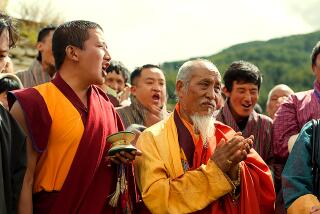Buddhist Monk, Believed Possessed by Spirit of Diety, Serves as Oracle for Tibetans : Adviser to Dalai Lama : Buddhist Monk Is Oracle for Tibetans
DHARMSALA, India — A young Buddhist monk convulsing under a trance and waving a sword and bow in a ritual dance has a say in every important decision of the Tibetan exile leadership.
Dressed as an ancient warrior, he is the chief state oracle of the Tibetans, through whom they believe the spirit of the deity Nechung guides their leader, the Dalai Lama.
Few important decisions are taken by the exiled Dalai Lama and his high officials without consulting the oracle, 31-year-old monk Thupten Ngodub.
Until two years ago Ngodub was an ordinary monk living in Dharmsala’s Nechung Monastery in north India. In March, 1987, he indicated that he had become 14th Nechung Oracle.
During special prayers at the Nechung Monastery for the appearance of a successor to the 13th oracle, who died in 1984, Ngodub suddenly collapsed in a trance.
Tibetans believe he was briefly possessed by the spirit of Nechung, one of two deities that are believed to protect Tibetan Buddhism and guard the Dalai Lama, who fled Tibet with thousands of his followers 30 years ago after a failed uprising against Chinese occupying troops and now leads a campaign for Tibetan independence from his exile in Dharmsala.
At least 16 people were killed in February as pro-independence demonstrations broke out in the Tibetan capital, Lhasa. China then imposed martial law.
“It was not like seeing a person, a spirit in human form. It was more connected with a physical experience,” Ngodub said during an interview.
“At that very moment I felt uneasy and fear originated in my mind and then I felt as if I had been shocked by electricity and I slowly lost my memory,” he said.
Before Ngodub could be confirmed as oracle, he was summoned by the Dalai Lama to undergo secret tests while in a trance.
Speaking at his monastery, which has panoramic views across the Himalayan foothills to the north Indian plain, he was unable to describe the tests. He remembers nothing from his trances.
But he obviously passed. A few months later he was formally enthroned as the chief of three state oracles. Ngodub is the only one said to have powers of prophesy.
He automatically became abbot of the Nechung Monastery and No. 5 in the hierarchy of the Dalai Lama’s government-in-exile.
The oracle is consulted about once every two months by the Dalai Lama, the Kashag, or exile cabinet, or senior monks, but in most cases his advice remains a carefully guarded secret.
“His holiness (the Dalai Lama) will ask once or twice a year or sometimes five or six. It depends on the circumstances,” said the shaven-headed monk with a ready smile and a gold watch strapped to his wrist.
Ngodub took delight in showing a video recording of one of his oracular performances at a recent consultation by lamas at a south Indian monastery.
The first sign of possession comes after about half an hour of meditation. His chest begins to heave convulsively and his lips draw back from his teeth in a grimace.
Already dressed as an ancient warrior in elaborate silk robes of gold and green, his attendants swiftly strap a huge gold, silver and silk headdress on and help him to his feet.
Slowly, the oracle does a ritual dance, a sword in one hand and a bow in the other, before the questions begin. Each is answered in a high pitched sing-song voice that one of his attendants helps interpret.
After about five minutes, the trance suddenly ends and Ngodub collapses still convulsing. The headdress is ripped off and he is carried away exhausted from his performance to rest for at least an hour.
“It’s like getting a shock from electricity,” he said through an interpreter. “This shock does not go down immediately but after a while I regain my memory.”
Some Tibetans are skeptical about the idea of an oracle and believe he plays too important a role in Tibetan society, but Ngodub has no doubt that he is truly possessed by Nechung.
More to Read
Sign up for Essential California
The most important California stories and recommendations in your inbox every morning.
You may occasionally receive promotional content from the Los Angeles Times.










